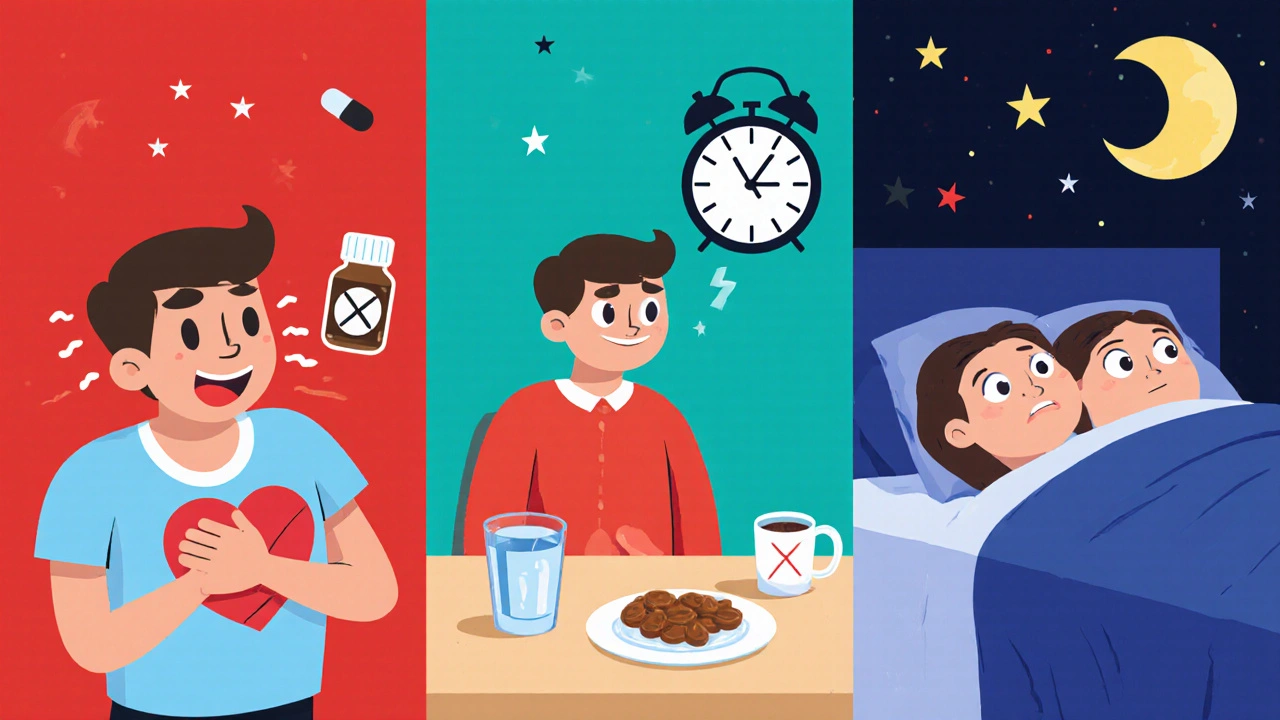
Levothyroxine Timing Calculator
Determine the safest timing for taking levothyroxine with other medications, supplements, or food to minimize side effects and maximize absorption.
How to Use This Calculator
Levothyroxine should be taken on an empty stomach with water
Wait at least 30-60 minutes before eating or taking other medications
Different substances require different waiting times
Taking Levothyroxine is a synthetic form of thyroxine (T4) that restores normal hormone levels in people with hypothyroidism a condition where the thyroid gland does not produce enough thyroid hormone. While it’s a lifesaver for many, the medication can bring a handful of unwanted reactions. This guide breaks down the most common levothyroxine side effects, explains why they happen, and offers real‑world ways to keep them under control.
Why Side Effects Happen
Levothyroxine is absorbed in the small intestine and travels through the bloodstream to every cell. If the dose is a little too high, or if the drug interacts with food or other pills, the hormone level can overshoot. That temporary excess triggers symptoms that often masquerade as other health problems, making it tricky to pinpoint the cause.
- Absorption can drop by up to 40% when taken with calcium or iron supplements.
- Changing your diet, stress level, or even weight can shift how the drug is processed.
- Individual genetics affect how quickly the liver converts T4 to the active T3 form.
Because of these variables, regular monitoring-typically with a TSH test a blood test that measures thyroid‑stimulating hormone to gauge thyroid function-is essential.
Most Common Levothyroxine Side Effects
Side effects usually fall into three groups: cardiovascular, gastrointestinal, and neuro‑psychiatric. Below is a quick snapshot of what you might notice.
| Category | Typical Symptoms | First‑line Management |
|---|---|---|
| Cardiovascular | Heart palpitations, rapid heartbeat, elevated blood pressure | Check dose timing, avoid stimulants, discuss dose reduction |
| Gastrointestinal | Nausea, diarrhea, abdominal cramps | Take medication on an empty stomach, separate from food by 30‑60min |
| Neuro‑psychiatric | Insomnia, anxiety, mood swings, tremor | Adjust bedtime, limit caffeine, monitor dose |
| Metabolic | Weight loss or gain, increased appetite | Review calorie intake, discuss dose with clinician |
| Dermatologic | Hair loss, dry skin | Ensure proper nutrition, consider topical moisturizers |
Managing Specific Side Effects
Heart Palpitations and Rapid Heartbeat
These are often a sign that the dose is a touch high. Your heart is reacting to excess thyroid hormone.
- Schedule a TSH test within 4‑6 weeks of any dose change.
- Reduce caffeine and nicotine, both of which amplify heart rate.
- If palpitations persist, ask your doctor about a modest dose reduction (often 12.5‑25µg).
Gastrointestinal Upset
Taking the pill with food can hinder absorption and irritate the stomach.
- Swallow the tablet with a full glass of water at least 30minutes before breakfast.
- Avoid simultaneous intake of calcium supplements often taken for bone health, which bind levothyroxine and lower its absorption or iron supplements commonly prescribed for anemia, also interfere with levothyroxine uptake. Separate them by 4hours.
- If nausea continues, ask about a liquid formulation, which some patients find easier on the gut.
Insomnia and Anxiety
These symptoms tend to spike when the medication pushes your metabolism too high.
- Take levothyroxine early in the morning (6‑8am) to give your body time to metabolize before bedtime.
- Limit evening caffeine, alcohol, and heavy meals.
- Mind‑body practices-deep breathing, short walks, or yoga-can calm the nervous system while you adjust the dose.
Weight Changes
Weight loss may feel like a bonus, but rapid shifts can be unhealthy.
- Track your weight weekly; a 2‑3lb change in a month signals a dose tweak is needed.
- Maintain a balanced diet: adequate protein, healthy fats, and complex carbs.
- Discuss with your clinician if you notice a steady gain-sometimes the dose is too low, leading to metabolic slowdown.
Hair Loss and Skin Dryness
These are usually temporary as your body adapts.
- Ensure you’re getting enough omega‑3 fatty acids and biotin through diet or supplements.
- Use gentle, sulfate‑free shampoos and moisturizers.
- If hair loss continues beyond three months, request a thyroid antibody test to rule out autoimmune activity.

When to Call Your Doctor
Most side effects ease within a few weeks, but some red‑flags demand prompt attention:
- Chest pain, severe palpitations, or shortness of breath.
- Persistent vomiting, diarrhea, or severe abdominal pain.
- Sudden, unexplained weight loss (>10lb in a month) or gain.
- Rapid mood swings, thoughts of self‑harm, or severe anxiety.
These could indicate overtreatment or an underlying condition that needs a different approach.
Tips to Reduce Unwanted Effects
- Stick to the same brand and tablet size; switching can alter bioavailability.
- Keep a simple log: dose, time taken, any symptoms, and meals. Patterns emerge quickly.
- Pair the medication with a small, low‑fiber snack if the empty‑stomach rule feels too harsh-just avoid calcium‑rich foods.
- Stay consistent with your bedtime and wake‑up time; sleep rhythm influences hormone metabolism.
- Ask about bone density testing a DEXA scan that checks for osteoporosis, especially important if long‑term levothyroxine leads to excess calcium loss if you’re over 50 or have risk factors.

Monitoring and Follow‑Up
Effective management hinges on regular follow‑up:
- Initial check‑up: TSH test 6‑8 weeks after starting or changing dosage.
- Stable patients: repeat TSH test every 6‑12 months.
- If you’re pregnant, have heart disease, or are over 65, your doctor may test every 4‑6 weeks.
Bring your symptom log to each appointment; it gives the clinician concrete data to fine‑tune the dose.
Frequently Asked Questions
Can I take levothyroxine with coffee?
A small cup of coffee is okay, but wait at least 30minutes after the pill. Coffee can slightly reduce absorption, especially if you sip it continuously.
Why does my heart race after a dose?
A racing heart usually means the dose is a bit high for your current metabolic needs. A quick TSH test can confirm whether the hormone level is too elevated.
Should I avoid all calcium foods?
No, just keep calcium‑rich foods or supplements at least four hours apart from the pill. Dairy, fortified juices, and leafy greens are still healthy choices.
Is weight gain a sign that I’m under‑dosed?
Often, yes. If your thyroid hormone is low, metabolism slows and weight can creep up. A repeat TSH test will tell if a slight dose increase is needed.
Can I switch to a liquid form?
Yes, the liquid version can be easier on the stomach and may have fewer interactions with food. Discuss the switch with your prescriber, as dosing ratios can differ.
Rebecca Mikell
Thanks for the thorough rundown! I’ve found that keeping a simple spreadsheet helps me spot patterns-like if a coffee habit coincides with a jittery heartbeat. Setting the pill first thing in the morning with a full glass of water and waiting 30‑45 minutes before breakfast really cuts down the stomach upset for me. Also, I always separate calcium supplements by at least four hours; it’s a small habit that makes a big difference. If you ever feel off, a quick TSH check is the best sanity check.
Alyssa Griffiths
Wow-this article really covers everything, from absorption quirks, to cardiovascular red flags, to the subtle dermatologic whispers; however, let’s not forget that many patients are secretly being fed misinformation by the pharmaceutical lobby, which quietly manipulates dosage guidelines, and the so‑called “standard” tablets are often swapped out for bio‑equivalents without proper disclosure; moreover, the calcium‑iron interaction isn’t just a minor inconvenience-it’s a deliberate design flaw embedded in our dietary recommendations, and only a handful of whistleblowers know the full extent of this covert operation.
dany prayogo
Oh great, another miracle pill that promises to fix everything and then sneaks a side‑effect parade right under your nose. You'd think after decades of thyroid research we'd have mastered a flawless dosing system, but no, we still rely on guesswork and patient patience. The so‑called ‘common side effects’ are basically just the body screaming that you've over‑caffeinated a hormone that already runs on an overactive treadmill. Heart palpitations? Congratulations, your heart just decided to audition for a drum solo because you tipped the hormonal scale a tad too high. Gastrointestinal turmoil? Sure, nothing says ‘I’m thriving’ like a morning of nausea that makes you regret that extra toast. Insomnia and anxiety? If you wanted a nightly horror flick, just take your dose at midnight and watch your mind race. Weight fluctuations are the universe’s way of reminding you that metabolism isn’t a static thermostat but a temperamental thermostat with a mind of its own. Hair loss? Look at you, losing more strands than a stressed‑out squirrel. Dry skin? Perfect, now you can add another layer of moisturizer to your already crowded bathroom shelf. The article suggests logging your symptoms-great, because everyone loves turning their lives into a spreadsheet of misery. And the advice to avoid calcium for four hours? That’s just another excuse to binge on dairy later and feel guilty. You’re supposed to keep consistent brand and tablet size, which is essentially a corporate loyalty program disguised as medical advice. Regular TSH testing every six months? Sure, let’s schedule a blood draw reminder just to keep the lab techs busy. If you’re pregnant or over 65, testing every few weeks-because why not add more appointments to an already chaotic life? In the end, levothyroxine is a double‑edged sword that slices through hypothyroidism while carving little nicks all over your daily routine, and you’re expected to navigate that maze with a smile.
Wilda Prima Putri
Sure, let’s just add more pills to the chaos.
Sharif Ahmed
Behold, the humble tablet of levothyroxine-a veritable alchemist’s stone that transmutes dormant glands into roaring furnaces of metabolic fire. Yet, like any potent elixir, it demands reverence, precise timing, and the humility to bow before the unforgiving court of endocrine balance.
Arjun Santhosh
yo i tried the tip of taking levothroxine with water before brekfast and it actually helped my stomach not feel like a rollercoaster. i also keep my calcium pills far away-like 4 hrs away-so no weird absorption probs. my doc says check TSH every 6 months, but i set a reminder on my phone cuz i forget a lot.
Stephanie Jones
In the quiet corridors of our bodies, hormones whisper the ancient truth that balance is a fleeting illusion, and levothyroxine, though a benevolent messenger, reminds us that every intervention carries the echo of unintended consequence. When the heart races, perhaps it is not the dose but the soul's yearning for pace; when hair thins, the scalp may be mourning the loss of identity. Thus, we must tread gently, listening not only to labs but to the subtle poetry of feeling.
Chelsea Kerr
That’s spot on, Arjun! 👍 Keeping a simple reminder on your phone works wonders and the 4‑hour gap for calcium is a game‑changer. If you ever need a printable log template, just shout-happy to share! 😊
Tom Becker
Everyone pretends levothyroxine is just a harmless hormone replacement, but the truth is it’s a tool in a larger pharmaco‑political agenda designed to keep us dependent on endless prescriptions and quarterly blood tests. The “standard” dosage guidelines are secretly tweaked by big pharma to boost sales of brand‑name pills, while the cheap generics are pushed as inferior to drive the market. Stay vigilant, read the fine print, and question why your doctor never mentions the hidden side‑effects linked to long‑term use.
Laura Sanders
Actually the dosage guidelines are based on extensive peer‑reviewed research and regulatory oversight.






Write a comment